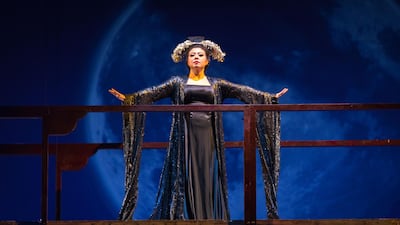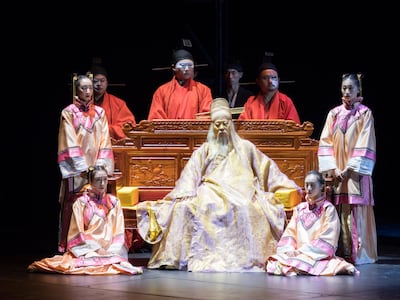The success of a performance of Turandot, Puccini's final opera, hinges on two things. Firstly, the conductor must rein in the orchestra, as there is a tendency to rather blast through the score with too much gusto and not enough nuance. Secondly, the set design should be airy and understated, transporting us to a magical Peking, where the drama takes place, not some kitsch Chinese palace, full of cheap lanterns and nasty-looking gold statues.
What a relief, then, to discover that the Shanghai Opera House's strikingly beautiful version of Turandot, which opened the new season at Dubai Opera on Thursday night, avoided both of these pitfalls. Xu Zhong conducted the orchestra with assurance, allowing the despair of arias such as "Figlio del cielo" to linger, while bringing a necessary perkiness to the lighter moments. There was no shortage of emotion but things never tumbled out of control, either – a tricky balancing act to pull off.
The set design, meanwhile, was simple – enormous, slightly smudgy paintings of ancient Peking provided the backdrop; books hung from the ceiling in the palace library – and a silvery wash of light brought an ethereal, otherworldly feel to proceedings. It was as if we were suspended tantalizingly in that delightful moment between waking and sleeping.
The role of Turandot is devilishly difficult to sing and the audience rarely has much sympathy for the uncompromising princess, who will only marry the man who successfully solves her three riddles. Chinese soprano Hui He was fearsome in the role, not overacting or allowing that icy façade to slip. She made her way to the centre of the stage in act one and ordered the execution of a young prince with sinister calculation and showed rare restraint during her first aria, “In questa reggia”. If only other sopranos singing the role of Turandot would take note and ease up on the shrieking.
Chinese tenor Han Peng was a little stiff as Prince Calaf, the man who falls in love with Turandot and solves her three riddles. It was hard to find technical fault with his version of “Nessun dorma”, but he could perhaps have given it a bit more welly, while I was never quite convinced of his undying love for Turandot.
Elsewhere, the jolly ministers Ping (Tao Kuo), Pang (Zheng Yao) and Pong (Wu Botao), who try to dissuade Calaf from pursuing Turandot, were particularly amusing, clowning ostentatiously and flashing knowing glances at each other, as they whirled and twirled across the stage together. This trio were upstaged only by Xu Xiaoying as Liu, the pitiful and loyal slave to the deposed King of Tartary. Xiaoying’s voice was crisp and invigorating, her tragic aria “Tu che di gel sei cinta” the most affecting moment of the night. She deserved all the plaudits.
A spirited chorus and exceptional dancers ensured that we gradually became immersed in Turandot's regal but brutal world. The violence of Puccini's opera was a touch underplayed by director Roberto Ando but an unexpected and happy consequence of this was that the mystical elements of the production – the moon projected onto a screen; the ceremonial removal of Liu's body after her suicide – were given prominence, allowing us to sink blissfully into an Eastern dreamland. A triumph.
Turandot is at Dubai Opera until September 7. More information and tickets available at www.dubaiopera.com



